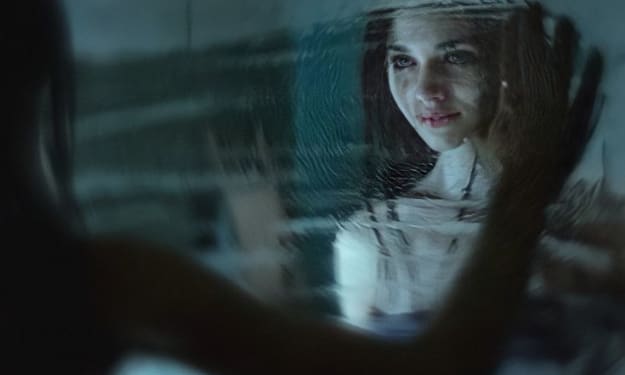How Do You See Yourself?
Reflections about our self-image and that of our children

A Bit About Self-Image
Self-image is all the things we notice and feel about ourselves, how we believe others see us, and the way we see ourselves in our best version. In short, it’s about how you see yourself and how you think the world and God see you. And it’s not just about how you look. It’s about all your real and imagined qualities and flaws.
What’s interesting is that self-image is fluid. It depends on past experiences, interactions with others, and the subconscious. You don’t know your self-image unless you look carefully. Statements like “I can’t do this” or “I’m not that kind of person” are descriptions of our self-image.
If you give yourself some time and attention, your self-image can improve. Maybe you weren’t good at leading projects at 25, but maybe you’ve become better since then.
It’s not easy to change our self-image. That annoying voice in your head clings stubbornly to the old version because that’s what it knows and because the mind always seeks the comfort of the familiar.
Often, our self-image is far from objective reality. And it’s what holds us back, preventing us from growing, knowing ourselves, and making major changes.
Teenagers and Self-Image
I’ve been thinking about self-image for a while now, especially since I’ve been in contact with teenagers through a course I’m attending. With very few exceptions, they are very demanding regarding how they see and analyze themselves. They see themselves as ugly, worthless, talentless, and confused, thinking they’re good for nothing. Here, even social media fakery doesn’t help much, but it’s more than that.
How you see yourself has a major impact on success in life.
Do you see yourself and your self-image clearly in this moment?

Children and Self-Image
Young children don’t have a self-image yet. How can we help them discover themselves without influencing or minimizing their self-worth?
As they grow, children's self-image develops based on how others express themselves in the child’s presence. Initially, children have an inflated self-perception.
Evidence revealed that children younger than 7 years have an inflated self-perception and are eager to participate in activities regardless of competence.
— Body Image and its Role in Physical Activity, by Cassidy M Foley Davelaar
I did a little test on my children last night and noticed that both of them have a fairly good self-image. Our young is better, she has always been outgoing and relaxed, while the boys are a bit more anxious. But overall, their self-image is good, beyond reality, if I were to look at how I see them (of course, I’m subjective). They look at themselves with indulgence, so to speak. The boys are 8 and 6, respectively, and our youngest is 3.
What I notice in young people is that as they grow, their self-image deteriorates in most cases. In adulthood, we end up hating our bodies and abilities.
Adulthood and Self-Image: My story
With self-awareness, in adulthood, we start picking up the pieces if we are lucky and start reshaping ourselves.
I also studied my mother in this respect. She severely undervalued herself in all aspects. She’s very critical of herself, her body, and her completed versus uncompleted tasks. It dawned on me once in therapy that she has been mirroring her self onto me, criticizing the same things for years. The question is here, who has done the same to her when she was a child?
I did the same to myself for decades. Only after years of therapy did I manage to change my self-image to a positive one. Until I was in my thirties, I constantly criticized and devalued myself. That’s what I was told about myself: that I was procrastinating, that I didn’t understand things quickly enough, and that other people my age were always succeeding at everything better than me.
I remember vividly in childhood having neighbors and good friends who often told me, daily, that I had a rabbit face, with my two big front teeth. My dad and mom found it amusing, even cute. But it wasn’t really, it was rather traumatizing because bullying is never funny.
I remember frequently analyzing myself in the mirror, especially after studying rabbits in a nature studies book. At first, I didn’t think I looked like a rabbit, but over time, I convinced myself I did. That’s when I started to hide, to feel more invisible, or to wish I were so.
In middle school, I found out I had furry arms, because my hair started to grow in various places too. Hello, puberty! At 16, I used all sorts of anti-cellulite creams, even though I’m sure now that I didn’t have cellulite back then.
My mother was jokingly calling me a whale because she wanted me to always pay attention to how I looked, mirroring herself. But that’s the irony of it, I was thin and oh so innocent and I was not my mother.
This is how my thoughts could be influenced by anyone talking such nonsense and I would believe them, and integrate these beliefs almost automatically. My self-worth was already suffering by then.
“If you spent your life concentrating on what everyone else thought of you, would you forget who you really were? What if the face you showed the world turned out to be a mask… with nothing beneath it?”
― Jodi Picoult, Nineteen Minutes
And that’s how I ended up at 22, convinced I was ugly and stupid, that I only got to go on exchange abroad because of some sort of favorable coincidence, not through my own worth, that I managed to get a high grade on my high-school graduation exam, that I managed to learn to be the best in university and get my bachelors while doing one more exchange program abroad.
Finally, I decided I needed to go away and explore the world. So I moved abroad for two years for my masters, where I got a job as a researcher, did another study abroad, and graduated with an MSc in International Business.
While some part of me was insisting I did it all by myself, with incredible focus and working towards my goals, another part of me kept comparing myself to others.
Somehow I was still not convinced of my worth, and my self-image was confusing, to say the least. Who was I, really?
After becoming a mother and later also doing a few years of therapy, I started to look at myself with a new curiosity. My children showed me a different mirror of myself, my partner showed me a different kind of love and unconditional support, one that isn’t based on humiliating the partner to keep them captive but on supporting and appreciating them. That’s how we could grow together all this time. Meanwhile, my self-image has been repaired and is constantly changing.
“I know that mirrors give us a false sense of confidence.” I continued. “The reflection that we see everyday has nothing to do with how others see us. The glass lies.”
― Rasmenia Massoud, Human Detritus

The Self-Image Exercise
If you’re curious about your self-image, you can do this exercise, which is quite simple. I pieced it together with questions from various sources cited below, and also questions I have worked with during my therapy sessions.
Rate yourself from 1 to 10 in these areas:
- How do you see yourself physically? Would you say you have a beautiful body? What do you think about your face? How about the way you walk, dress?
- How are you with your friends? Would you say you’re more popular or lonely? Are you pleasant or unpleasant? What do you think your friends think about you?
- Professionally, do you consider yourself successful? Are you valued at work? Do people see you as a role model? Is there something you can teach others?
- Morally, how are you? Do you have healthy values and principles? Do you live according to them?
- Are you a compassionate person? Do you help others? Do you make a significant contribution?
- What kind of parent are you? What’s your relationship with your children like? Are there many things you reproach yourself for? What do you think your children think of you? Do they think you’re a good parent?
Discuss these ratings with those around you, your family, friends. You might find that you’re very far from what you think people feel about you. So it is important to see how the others see you and understand your own thoughts through your ratings.
Instead of a conclusion, reflecting a bit more
It’s a difficult subject, one I’ve only learned about through living my life and constantly learning. Only recently have I started reading more in-depth about self-image, to understand. I wish my kids to have as accurate a self-image as possible, closer to reality, but I don’t know if that’s ideal.
What I learned all these years is that if we look at ourselves with compassion and curiosity, allowing our inner child, present self and the parent we integrated more (in my case, my mother) to somehow co-exist and be loved, then we can make changes in how we perceive ourselves and we can grow instead of stumble and criticize our self-worth and being.
📩 Maybe it’s good to have a slightly better self-image? Or the opposite? What do you think?
Please let me know in the comments and let’s start a discussion on the topic of body-image and how it affected you or someone you know.
Thanks for reading!
Sources:
- 2+ Positive Body Image Activities & Worksheets, https://positivepsychology.com/positive-body-image/
- Foley Davelaar CM. Body Image and its Role in Physical Activity: A Systematic Review. Cureus. 2021 Feb 16;13(2):e13379. doi: 10.7759/cureus.13379. PMID: 33754104; PMCID: PMC7971183.
- Thomas JD, Vanness JM, Cardinal BJ. Physical Fitness and Self-Image: An Evaluation of the Exercise Self-Schema Questionnaire Using Direct Measures of Physical Fitness. Int J Exerc Sci. 2016 Oct 1;9(3):445–459. PMID: 27766132; PMCID: PMC5065326.
---
***I originally published this story on Medium.***
💗 Thank you for reading! Hearts, pledges, and tips are motivating me to write more. I appreciate your support.💗
You could also buy me a coffee or a tea and/or let me know your ideas in the comments section.
About the Creator
Gabriela Trofin-Tatár
Full Stack Developer in the making and mother of 3 littles. Curious, bookaholic and travel addict. I also write on Medium and Substack: https://medium.com/@chicachiflada & https://chicachiflada.substack.com/
Reader insights
Outstanding
Excellent work. Looking forward to reading more!
Top insights
Excellent storytelling
Original narrative & well developed characters
Expert insights and opinions
Arguments were carefully researched and presented
Eye opening
Niche topic & fresh perspectives
On-point and relevant
Writing reflected the title & theme






Comments (3)
Self image sometimes is difficult to find,Once we start to love ourselves,accept who we are really,then we will have our self image!
Excellent article!!! I will turn 70 this summer and aging changes our self-image...there's not much we can do about flaws and our grown children look at us "differently" during that phase of life. We just have to learn to be satisfied with our inner soul.
This a wonderful well written article. I cannot wait to do the excercise. This would make a great Challenge prompt as well ♥️💗